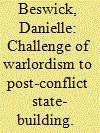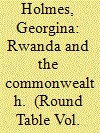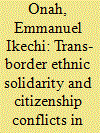|
|
|
Sort Order |
|
|
|
Items / Page
|
|
|
|
|
|
|
| Srl | Item |
| 1 |
ID:
089137


|
|
|
|
|
| Publication |
2009.
|
| Summary/Abstract |
Using evidence from the case of Congo, focusing in particular on the eastern Kivu provinces, this article argues that the enduring presence of warlords, and the influence of their international supporters, remains inadequately addressed by current practices of post-conflict state-building. The dominant contemporary model of state-building currently focuses on the promotion of liberal democracy as a way of avoiding future conflict, highlighting in particular the key role of elections. Simultaneously, it emphasises the importance of security and developing a state monopoly on violence. However, in the pursuit of both these ends in Congo, warlord politics and interference from regional powers continue to pose significant challenges. Exploring key aspects of the rebel movement led by Laurent Nkunda in east Congo (2004-2009), this article will illustrate some of the challenges warlordism poses in Congo, focusing particularly on the shortcomings of a 'single sovereign' approach to state-building. In conclusion, the experience of the Kivus indicates that an approach recognising multiple sovereignties or emphasising significant decentralisation may be more appropriate. Without such a shift in emphasis the notion that Congo is, or will soon become, an empirically functional state is perhaps wishful thinking.
|
|
|
|
|
|
|
|
|
|
|
|
|
|
|
|
| 2 |
ID:
107088


|
|
|
|
|
| Publication |
2011.
|
| Summary/Abstract |
As with most British media coverage in 1994, the BBC did not report genocide in Rwanda, preferring instead to depict political violence as tribal civil war and 'primitive' ethnic conflict. Yet when the international community declared that genocide had taken place, the BBC was quick to change its tack, moving away from reporting ethnic conflict towards memorialising genocide. Referring to the BBC's website, political discussion programmes and documentary films, the article considers how over time an institutional narrative on the 1994 genocide has developed. The author argues that the BBC has been required to reconcile the problem of depicting genocide-conventionally seen as modern, 'Western' political violence-in Africa. The ways in which the BBC has remembered Rwanda's genocide also conceal from view British foreign policy decision-making between April and July 1994. The author then considers how, since Rwanda joined the Commonwealth in November 2009, the BBC's reporting has shifted again-this time towards framing news in the context of democracy and freedom of speech.
|
|
|
|
|
|
|
|
|
|
|
|
|
|
|
|
| 3 |
ID:
137201


|
|
|
|
|
| Summary/Abstract |
This paper is a study of the phenomenon of trans-border ethnic relations and its impact on national integration and citizenship in the countries of West and Central Africa where trans-border ethnic groups exist. Despite the existence of many such groups in these regions, and the numerous problems associated with the continued relations among these groups across their countries of abode, the phenomenon has not been seriously studied, especially as it concerns the identification of members of such groups and how they are viewed by members of other ethnic groups, as citizens of one country or the other. This paper notes that trans-border ethnic solidarity ordinarily presents the relevant African states with two possibilities, namely: enormous benefits accruing from regional integration and cooperation among states harbouring fractions of trans-border ethnic groups; or, debilitating conflicts within and between these states. It is the reality of the latter possibility that this paper examines. The states and the international system are often incapable of containing this phenomenon of trans-border ethnic solidarity and usually respond in hostile ways, ultimately manifesting in citizenship problems. The study shows, however, that what is needed is not conflict but cooperation – within and between states having fractions of a trans-border ethnic group, and within the international system, for the enhancement of national citizenship and development in West and Central Africa.
|
|
|
|
|
|
|
|
|
|
|
|
|
|
|
|
|
|
|
|
|